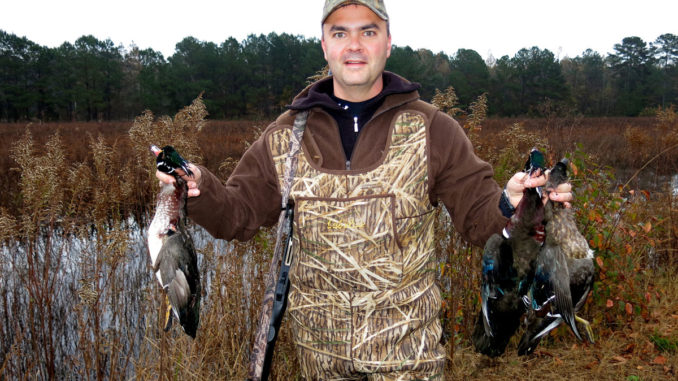
The largest chunk of waterfowl season arrives this month, giving hunters six weeks or so of duck-hunting madness. For the ducks, the re-opening is far from an exciting event, and they will shy away from places with excessive disturbance.
Ducks are at the mercy of habitat availability. In the Carolinas, prime waterfowl habitat is plentiful along the coast but is covered with hunters. In other areas, public waters can be quite limited. In places used by migrating waterfowl, landowners need to manage hunting pressure to keep the birds coming in.
Along the coast, ducks have plenty of places to get away from hunters. The Carolinas’ coastal regions are littered with public waterways and marshy areas that are prime places for ducks to feed, rest and roost. Outside of the protected U.S. Fish and Wildlife Service’s refuge system, public grounds are free to hunt, and the thousands of duck hunters with camouflaged boat and leafy blinds make these waterways their home during the season. Hunters with boats can change scenery when the ducks do. The best coastal hunters will spend as much time scouting as actually hunting. The vast amount of water will keep the birds moving and shifting on a consistent basis.
Further inland and on private grounds, hunters have less control of where to hunt as hunters do along the coast. Hunters set up around beaver ponds, flooded river bottoms and management impoundments full of submerged food reserves. Ducks will migrate and homestead a prime food source as long as hunting pressure is limited or kept to a minimum. Food sources can be hot spots in both inland and coastal fringe counties. Inland areas with good waterfowl habitat are in short supply and will fill up with winged migrants in a hurry. They will stay until either the food is gone or the hunting pressure gets out of control.
Private waters along the coast can be super places to hunt even though the coastal birds have thousands of acres of flooded grounds to use. The small, protected grounds provide a perfect scenario for ducks in a place where most of their feeding, loafing and resting grounds are littered with boat hunters that constantly put pressure on them.
In areas where pressure can be controlled, hunting needs to be limited as much as possible to keep the birds around. For hunters with access to multiple impoundments or ponds, hunts should be rotated to reduce pressure on each water body. For the best results, hunts should be limited to one day per week and a maximum of two days per week per water body.




Be the first to comment